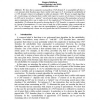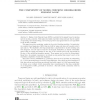166 search results - page 22 / 34 » Event Spaces and their Linear Logic |
111
click to vote
COR
2010
15 years 2 months ago
2010
In many real-life optimisation problems, there are multiple interacting components in a solution. For example, different components might specify assignments to different kinds of...
103
click to vote
AAAI
1998
15 years 3 months ago
1998
Temporal plans permit significant flexibility in specifying the occurrence time of events. Plan execution can make good use of that flexibility. However, the advantage of executio...
119
click to vote
CADE
2002
Springer
16 years 2 months ago
2002
Springer
We show that a conjunctive normal form (CNF) formula F is unsatisfiable iff there is a set of points of the Boolean space that is stable with respect to F. So testing the satisfiab...
122
click to vote
SPAA
1998
ACM
15 years 6 months ago
1998
ACM
Modern shared-memory multiprocessors use complex memory system implementations that include a variety of non-trivial and interacting optimizations. More time is spent in verifying...
104
click to vote
LMCS
2007
15 years 1 months ago
2007
Higher-Order Fixpoint Logic (HFL) is a hybrid of the simply typed λ-calculus and the modal µ-calculus. This makes it a highly expressive temporal logic that is capable of express...


